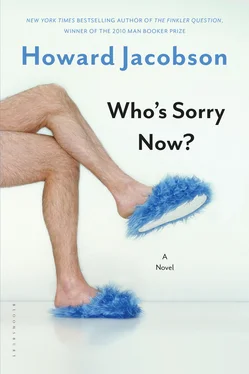And he’d told this to his mother ?
Marvellous that she remembered. How many years ago was it? Twenty-five? Thirty? But more marvellous still that he’d told her.
Why would he have told her?
‘Yes,’ he said, ‘something is vaguely coming back to me.’
‘It worried you at the time, I remember.’
‘It still worries me.’
She shook her head and took his hands, both remade into fists, one in each of hers. ‘You’ve got your health,’ she said. ‘You have two wonderful daughters. You have never been short of girlfriends. You make a good living. What do you have to worry about?’
It always saddened and bemused him, how little his mother expected of him now. Health, for God’s sake. Daughters, girlfriends, a living … Where had the other stuff gone? His destiny, his moral spotlessness, his genius? Couldn’t she at least be a little bit disappointed for him?
Or was that just the mouth issue all over again? Was that why he’d told her — so that she could pity and reprimand him, in equal measure? Did he seek his mother’s disappointment?
Christ!

Before he left, his mother took him to see Norbert in the lovely high-ceilinged sunlit room she’d built for him, quiet as his old library, every sound dying in deep lilac carpet, his books and papers, unread, all around him. How old was Norbert? Kreitman wondered. He looked ageless — a thousand years, a thousand days, impossible to tell — a creature washed of all his sins, only his tongue a problem to him, everything else apparently sorted, his eyes off on some unknown journey of their own.
‘Marvin’s here to see you,’ his mother said.
‘Hi, Norbert,’ Kreitman said.
Not a flicker.
Because Kreitman didn’t know what else to do, he waved.
Mona Bellwood went over to her husband’s chair and rearranged him, lifting him under his arms, as she must once have lifted Marvin, pulling the hair back from his unlined brow, tidying him around the ears, this never unkempt man. She raised her face and saw her son looking at her. She smiled a tired smile. ‘I know what you’re thinking,’ she said. ‘But he’s in here. He hasn’t gone. I know that when I touch him I’m reaching him.’
And you, Mother, Kreitman wasn’t able to ask, who’s reaching you?
‘You’re a believer in the soul, then?’ he said.
‘I always knew where you were when you were out,’ she reminded him, continuing to clean up her husband’s face, smoothing away the hairs, absently stroking his cheeks, rearranging his cravat. ‘I could always tell if something bad was happening to you. I don’t know whether you call that believing in the soul.’
‘So you know where Norbert is?’
‘I do, yes, definitely.’
‘And is something bad happening to him?’
She started to answer, but then couldn’t. Cracks suddenly appeared across her face, like the shattering of glass. She put up her hands to hide her grief, though whether from him or from Norbert he couldn’t say. Somehow, with a movement of her shoulders, she was able to signal him to leave. ‘How could you be so cruel, Marvin?’ she collected herself sufficiently to ask. But by that time he was out of the door.
It wasn’t safe for him to go out. When he made a call to one of his shops he upset the staff, and when he went to visit his own mother he upset her and himself. Death in the house and his mother ageing, and there was he, who should have been a comfort, absorbed in the trivia of self-damage, wondering what it meant that he wanted his mother to know he didn’t kiss like other men, and by natural extension — for all roads lead to the same place when you’re in the state Marvin Kreitman was in — wondering what sort of kisser Nyman was. That the reason Chas hadn’t taken him up on his offer — too busy kissing the faggot? A man more rattishly and motivationally stripped down to the bare bones blah-blah than he and Charlie rolled together — Chas’s own words. Meaning exactly what? That as men, as sexual men, as users of the mouth, he and Charlie didn’t add up to a hill of beans in Chas’s estimation?
It had come to something that he was bracketing himself with Charlie these days. Charlie and Marvin, two absolute no-hopers with women. Except that that description didn’t apply to Charlie any more, did it?
He had run into Shelley, when leaving his mother’s. On her way in to take up her nursing duties, so not starched yet, still in her civvies, if you could call them that. Thirty years old and wearing a tiny ruffle of a skirt, black convent tights and dinky bower boots, like a fairy who had come down off a Christmas tree, looking for a punch-up. Kreitman sighed. Those were the days.
He had forgotten what women were like. Was this what they did? When Shelley spoke to him she pushed her face forward, as though she wanted him to pat her head, like a cat. Little pink tongue. Little green eyes narrowed. Little cough, due to little fur ball in little throat. Lovely, Kreitman thought. So lovely he couldn’t think how he had forgotten. But no fault line. That’s why he had forgotten. No wonderment of rude.
So there he was, back to square one.
Not safe for him to go out, so he stayed in. Three calls from Chas in as many weeks, two anguished, one aerobatically cheerful, but still no lunch date. As for his wonderful daughters, they had put their various contractual obligations on hold, postponed the explanatory dinner he’d promised them — no hurry, Daddy — and gone hitchhiking around Thailand, looking for some beach. So who was there for him to go out and see?
Who was there for him to stay in and see, come to that? Sleeping without company had never suited him, even for the odd night, but this was the longest unbroken stretch of it he’d suffered since leaving school, and it was beginning to wreak havoc on his body. A man with a wife and five girlfriends showers at least six times a day. A man moping over an inaccessible woman showers less than that. Not a comment on his bachelor facilities: cramped though his Clapham hermitage was, it lacked for none of the eroticising amenities expected of a modern bathroom. Name a refinement of toiletry, Kreitman had it. Name the most powerful shower head, name a douche appliance, name a Roman bath … No, what Kreitman’s unaccompanied life lacked for was inducement. There was no good reason to pamper his body to the degree it had come to expect. Some days he never bothered to dress. Once or twice he never bothered to get out of bed. As a consequence he was beginning to notice upon himself something that looked like mould. The skin of tramps must look like this, he thought. Or the skin of old men. Kreitman’s flesh had always been important to him. Not muscles, not toning, not a tan, simply its integumental texture, its general air of lazy and maybe even absorptive, if not to say magnetic, good health. This flesh is in constant pleasurable employment, that was the notice he hung out upon his body. Now he was rotting.
Time to get a grip on himself, even if he couldn’t get a grip on Chas. A visit to his doctor, to the chemist, to the herbalist, to his hairdresser and to his outfitters was in order. Clean up the act.
Which was how he happened to run into Charlie Merriweather on Jermyn Street, loaded down with shirts, looking mighty pleased with the world and his own place in it, a man conscious of not having anything putrid anywhere about his body.
One night Charlie dreamed that Chas turned up and found him in his dressing gown with Hazel. Chas was carrying a teapot and smiling, but when she saw the dressing gown and then saw Hazel she burst into tears. The cruellest sort of tears, not tears that stream but tears that spurt out as though the eyes have sprung a leak. As she cried, she let the tea spill from the teapot on to Hazel’s carpet. ‘What’s she doing here?’ Hazel demanded, and although Charlie knew the answer he didn’t want to say.
Читать дальше













